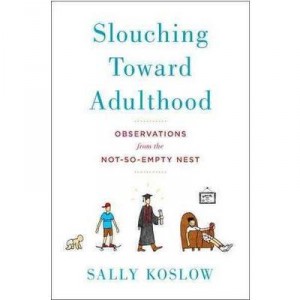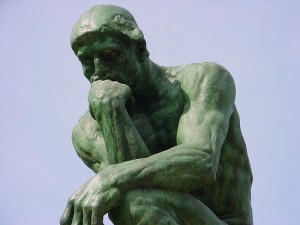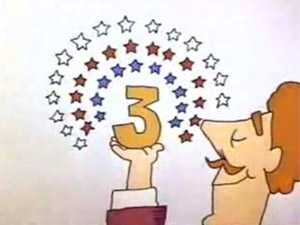The Adultescent Phase
July 14th, 2012 // 3:15 pm @ Oliver DeMille
 With more and more college graduates returning home to live with their parents, many adults are becoming frustrated with the rising generation.
With more and more college graduates returning home to live with their parents, many adults are becoming frustrated with the rising generation.
In the book Slouching Toward Adulthood, Sally Koslow shows how this trend is the natural result of the last two generations of parenting.
The problem is not so much the slumped economy and high unemployment, although these are realities, but the fact that using student loans to get through college is now the norm, so when students graduate they are loaded with debt and many can’t afford rent.
Even more difficult, the Boomer generation tended to bring up their children with an attitude that left little room for the lessons learned from failure.
This was mixed with a strangely controlling approach to scheduling and achievement.
As reviewer Judith Newman wrote in People (July 9, 2012):
“Recognize that channel-surfing, chips-snacking lump on the couch? It might well be your adult child. Koslow writes wittily about the infantilization of American youth as increasing numbers treat getting a job and moving out as just an option. The solution? Stop trying to inculcate our kids against failure, for starters.”
Koslow wrote the book in response to frustrations with her own sons.
One of them was a college graduate, twenty-five year old in her home who frequently slept until noon and then played with friends for the rest of the day and most of the night.
Over six million adult children now live with their parents, pay no rent, eat without limits from their parents’ fridge, and use the house, yard, cable and computers without paying for them.
Many consider their parents an ATM.
Moreover, very few of them are out actively seeking employment.
The irony, Koslow notes, is that most of these adults were raised in a culture where they were constantly told they were special.
The result is that they value having fun with friends, want to travel extensively, and look down on working for the money to pay for their lives, hobbies and interests.
Many of the generation see themselves as free spirits, but unlike the sixties generation they want the expensive yuppie lifestyles of freeloaders.
As Diedre Donahue put it in USA Today,
“The adults aren’t helping. Koslow believes parents often infantilize their adult children because it makes parents feel needed. The result: entitled but incompetent children and exploited but enabling adults.”
Of course, this doesn’t describe the entire generation, or even a majority of them, but it does accurately depict far too many.
This new adultescent trend, as Koslow calls it, doesn’t show any likelihood of slowing in the years ahead. If anything, it will likely increase.
Koslow writes of her own generation, the parents:
“The boomer generation, with its idiomatic immaturity and fury at the very idea that we have to age, is in no small part to blame for adultescents feeling as if there will always be time to break up with one more partner or employer, to search for someone or something better, to get another degree or to surf another couch, to wait around to reproduce.
“Thanks to our parents listening to Dr. Benjamin Spock and to us sucking up to TV ads that pandered to our kiddie greed, we established the model of unprecedented self-involvement, enhanced by our ceaseless boasting.”
As if that’s not enough, the new generation of adultescents “…crave attention and often cash from parents, whom they frequently ask to help them move from place to place; create a mess; rack up debt…”
Then, all too often, they blame their parents for their plight, anxiety, and lack of opportunity.
Koslow’s own sons have now moved away from home and on to adult lives, much to the relief of any reader who has adult children, and in most cases the adultescent phase does eventually pass even if it takes about a decade longer than it used to.
The Boomer system of consistent coddling has borne dismal results.
Sadly, the Tiger Mom approach to forced excellence and settling for nothing but top achievement also often results in adultescentism.
In contrast, helping young people take responsibility for their own learning, careers and lives right from the beginning pays off when they are adults.
Leadership education works.
The economy is difficult, jobs are scarcer than in three generations, and the feelings of youth entitlement at are a century (perhaps all-time) high.
But those with a leadership education know that they have a life mission and need to use initiative, innovation, ingenuity and tenacity to rise to their potential.
They may still want to join their generation and experience an adultescent phase, but in most cases it will be much shorter than that of their peers.
Maybe the best thing about this book is that it is all shared with a hilarious sense of humor. It’s not stressful, it’s fun.
So smile and enjoy your adult kids’ time with you. Give them real chores and rules in the home.
It’s your home, after all.
The key to helping the kids become adults is to be one yourself.
Oh, and charge them rent or have them work it off in equivalent ways. They’re adults, and treating them like it is a sign of respect.
***********************************
 Oliver DeMille is the chairman of the Center for Social Leadership and co-creator of Thomas Jefferson Education.
Oliver DeMille is the chairman of the Center for Social Leadership and co-creator of Thomas Jefferson Education.
He is the author of A Thomas Jefferson Education: Teaching a Generation of Leaders for the 21st Century, and The Coming Aristocracy: Education & the Future of Freedom.
Oliver is dedicated to promoting freedom through leadership education. He and his wife Rachel are raising their eight children in Cedar City, Utah.
Category : Blog &Book Reviews &Culture &Family &Featured &Generations
Common Wisdom versus Greatness in the American Election
July 14th, 2012 // 2:49 pm @ Oliver DeMille
 The common wisdom says that incumbent presidents run on their record, and that the state of the economy determines presidential elections.
The common wisdom says that incumbent presidents run on their record, and that the state of the economy determines presidential elections.
According to the numbers, right now the common wisdom is wrong.
The economy is still sputtering, but 51% of voters in battleground states like President Obama’s handling of the economy while only 42% like Romney’s economic plans (CNN/ORC International Poll, June/July 2012).
Furthermore, 41% of national voters believe Obama has a clear plan for improving the economy while only 27% believe Mitt Romney has one (Fox News Poll, July 2012).
In short, President Obama’s numbers aren’t great, but Governor Romney’s are worse. And 68% of Americans blame George Bush, not Barack Obama, for the poor state of the economy (Gallup Poll, July 2012).
Why is the common wisdom failing?
Analyst Juan Williams had it right on Fox News Sunday when he said that a majority of Americans see Mitt Romney as “a rich guy.”
It’s a rich guy versus a cool guy, and cool will always win in the American electorate.
Many Republicans and conservatives have criticized Mitt Romney for not having an effective plan to fix the economy.
Leaders from the Right—as different as Rush Limbaugh, Bill Crystal, George Will, and The Wall Street Journal—are concerned that Romney is doing little to establish himself as a serious leader on the issues.
They argue that he seems caught up in responding to attacks by Barack Obama and alternatively attacking Obama.
To have any chance in November, Romney needs to make real gains by September.
He may have little chance of being seen as cool, but he has every opportunity to go all in: To use his strengths and provide real leadership and a vision of what America can be and how he’ll lead us in the direction of American greatness over the next four years.
The common wisdom says, “It’s the economy, stupid!”
For the entire post-World War II era the common man has selected the candidate who seemed the most cool, the most likely to lead.
But both of these actually boil down to leadership.
Candidates must have strong, effective plans to take us in a moving and positive direction in the future, and they must be able to articulate this.
In 2008, Barack Obama very effectively presented a vision of a better America, a nation of change, a new era of unified cooperation in Washington, and a citizenry acting on the chant of “Yes, we can!”
Critics say that after inauguration he failed to deliver on these promises, but nevertheless he projected a moving vision and rallied a majority of voters behind it.
So far, neither candidate has done this in 2012.
If neither candidate can effectively articulate a great vision of the future, the incumbent will most likely win the election.
For this reason, the Obama campaign may be waiting to promote any sweeping grand vision of American leadership.
Why risk it if they’re winning anyway?
Thus the ball is in Romney’s court.
If Romney rolls out a great, Reaganesque vision of America, the Obama team will have to do the same and we’ll have a great debate in 2012.
Right now the high vision of the campaigns is, “We can’t go back to the failed policies of Bush,” versus “We must repeal Obamacare and Barack Obama or our economy will fall off a cliff in the next four years.”
Neither of these reach the level of a high debate.
They effectively speak to the base of each party, but the base was always going to vote for its candidate.
The real issue is independents, and neither side has effectively spoken to them.
President Obama is ahead in this battle because he has reached out in petite visions to special interest groups from Latinos to same-sex groups to women.
As Jimmy Fallon said in a late night comedy sketch, “President Obama said Americans need someone who will wake up every single day and fight for their jobs. Then he said, ‘But until we find that guy, I’m still your best choice.’”
We are experiencing a mini-campaign, focused on negative bantering about the small things.
Even the one big topic of debate, health care, is being discussed in micro-terms: about pre-existing conditions, adult children on their parents’ insurance, etc.
No candidate has yet taken bold leadership on the grand scale, to capture the American mind and propel the nation on a powerful, compelling journey toward the future.
The hottest days of summer are still ahead, and the American voters deserve a real debate on the biggest questions.
The opportunity for real leadership is here, and the voters are watching, hoping, for someone to step up and show us what leadership really means in the 21st Century.
Americans sense that our challenges are going to increase, and that it’s time for another great American leader like Franklin Delano Roosevelt or Ronald Reagan.
Note that neither FDR nor Reagan were the great leaders they became before they were elected, but they were both openly and clearly committed to a great vision of America’s future.
The election of 2012 will go to whichever candidate stands up and projects the image and agenda of greatness.
If neither candidate does this, voters will probably just stick with the incumbent.
In short, it’s common wisdom against common wisdom: cool versus the economy.
But Americans don’t want to follow the common wisdom, they want to be led by greatness toward a truly great vision of the future.
They want to be touched, moved and impressed.
They want to rally behind a great leader.
They want to believe that their vote will make all the difference, that the president in 2013 will take bold steps that put America on the path to greatness.
The nation is ripe for a candidate who exudes great plans, a great vision, and great leadership.
Right now either candidate could rise to this need, and the best-case scenario would be for both to step it up and embrace American greatness.
Whoever does this most effectively will win the election.
Both candidates are avoiding risk right now, but what we need is a leader who leads, who goes all in and stops thinking about winning the election and invites us to an America that wins the 21st Century.
***********************************
 Oliver DeMille is the chairman of the Center for Social Leadership and co-creator of Thomas Jefferson Education.
Oliver DeMille is the chairman of the Center for Social Leadership and co-creator of Thomas Jefferson Education.
He is the author of A Thomas Jefferson Education: Teaching a Generation of Leaders for the 21st Century, and The Coming Aristocracy: Education & the Future of Freedom.
Oliver is dedicated to promoting freedom through leadership education. He and his wife Rachel are raising their eight children in Cedar City, Utah.
Category : Blog &Culture &Current Events &Economics &Featured &Government &Leadership &Politics
A Third Power
June 25th, 2012 // 9:33 pm @ Oliver DeMille
Michael Strong wrote, in his excellent book Be the Solution: How Entrepreneurs and Conscious Capitalists Can Solve All the World’s Problems:
“A short history of twentieth-century economic and political thought might be summarized as:
“Market Failure! Markets don’t work as well as the classical economists thought and therefore we must control them (1900-1960).
“Government Failure! Governments don’t work as well as democratic theorists thought, and therefore we can’t depend on them to do the right thing either (1960-2000).”
 Markets are excellent for what they are for! Free markets create more wealth and distribute it more widely than any other economic model.
Markets are excellent for what they are for! Free markets create more wealth and distribute it more widely than any other economic model.
Under free markets we always witness a large middle class.
But the market doesn’t solve all problems in society.
Nor does government.
Neither markets nor governments solve everything.
Markets create more affluence and involve more people in prosperity than any other system, and governments are the most effective entity in protecting inalienable rights and maintaining laws that allow markets to flourish.
But there are a number of things governments should not do and markets will not naturally do, and these tend to be precisely the major challenges our society faces (and seldom solves).
If we are to effectively address society’s main ills (beyond a quality standard of living for most people and the protection of our rights and freedoms), people need to voluntarily take on the world’s ills and find ways to address them.
Charity, philanthropy, volunteer service, service project and social entrepreneurship (the creation of companies or projects with the specific goal of addressing societal problems) is vital.
Government is great for what it is for, but it becomes dangerous to all when it goes beyond its proper role.
Markets are fabulous for creating affluence and helping spread it to a large middle class, but they are not focused on fixing the various societal ills.
It is up to people to improve our world beyond the natural roles of government and markets.
The discussion nearly always centers around how government should do everything versus how government should do less and leave more to markets.
But those arguing for markets too seldom go out and really implement needed solutions in our communities and nation.
It’s time to get past the old Cold War argument.
Of course government should be limited, of course markets can do many things better than government, and of course markets depend on good government policy for safety and the rule of law.
But there is another piece to fixing the world: the non-governmental, non-market driven action of individuals who see a need and set out to make a difference.
***********************************
 Oliver DeMille is the co-founder of the Center for Social Leadership, and a co-creator of Thomas Jefferson Education.
Oliver DeMille is the co-founder of the Center for Social Leadership, and a co-creator of Thomas Jefferson Education.
He is the co-author of New York Times, Wall Street Journal and USA Today bestseller LeaderShift, and author of A Thomas Jefferson Education: Teaching a Generation of Leaders for the 21st Century, and The Coming Aristocracy: Education & the Future of Freedom.
Oliver is dedicated to promoting freedom through leadership education. He and his wife Rachel are raising their eight children in Cedar City, Utah.
Category : Blog &Culture &Current Events &Economics &Featured &Government &Leadership &Mission &Statesmanship
The One Thing That Really Annoys Me
June 13th, 2012 // 2:54 pm @ Oliver DeMille
I think I’ve heard every side of the education debate over the past two decades, including different theories of education, the pros and cons of each new educational fad and curriculum, and the opinions of those who support the typical education system versus the many differing views from those who don’t.
I find most of this discussion healthy and intriguing—after all, all the passion shows that many people care deeply about the education of our children.
But there is one thing that really annoys me.
I read it again just this week.
An otherwise stellar writer and usually wise thought-leader said it, and though I’ve heard it before I still cringe whenever it comes up.
It’s the one thing you can’t really say about fixing education, because it is just plain wrong.
This frustrating argument goes something like this: American education needs serious reforming, there are a lot of good ideas on how to do this, but if the changes depend on parents it just isn’t going to work—the experts, in public and/or private schools, are the only ones who can lead this.
My response? This idea is totally false.
Moreover, it’s downright dangerous to a free nation. Those who promote this idea either don’t know what they are talking about or have some dark agenda.
The Bible says those who hurt our little ones should have a millstone put around their neck and be thrown in the ocean.
Okay, that’s not exactly what the Bible says. And clearly I’m putting too much angst into this. Many of the writers are probably good, well-intentioned people.
I need to calm down. Breathe. Live in the now. Zen.
But, as you can probably tell, this topic really gets my ire up.
I think one of the reasons it is so frustrating is that at first glance it sounds quite reasonable. Many people hear this and nod their heads reflexively.
That’s how much we’ve come to trust experts in modern times. “Give me an expert. Any expert…”
The truth is something quite different.
If parents don’t buy in, no educational reform is going to work, no matter how many experts, think tanks, studies, politicians and Presidents support the change.
More to the point, significant and lasting change will only occur when parents truly lead out.
Parents are the indispensable individuals in reforming education.
Certainly there are exceptions to this, examples of students with little parental support who succeed anyway, but the overall direction of education in society is led by a nation’s parents.
It’s time we admit this and approach education reform accordingly.
The future of our society doesn’t depend on Harvard, it depends on our dinner tables.
Current proposals to fix America’s education system are divided into roughly two categories: (1) those that recommend top-down reforms by experts, and (2) those that suggest changes by parents and students.
Both can help, of course.
With that said, there are very few of the second type, and these are given very little credence by the educational elite.
For example, Montessori, Charlotte Mason, homeschooling and other such bottom-up approaches are seen by the education bureaucracy as perhaps useful for a few children and families but not legitimate systems for widespread improvement of education.
This is the old mistake of aristocracies and meritocracies, where innovators become leaders and then their posterity, from their perch at the top of society, routinely discounts the validity of rising innovations.
An executive at 3M once told me that the company was founded by creative and innovative entrepreneurs, but that today none of them could even get an interview at 3M—their resumes just wouldn’t be enough to get through the door with the new-fangled HR guidelines.
Actually, some of the expert proposals for educational reform are quite good, even innovative.
But the attempt to apply them from the top-down, with expert educational theorists training school managers, is doomed from the start because parents are almost entirely left out of the formula.
The future of our educational system—and, by extension, nation—depends on the values of innovation, initiative, creativity, individualism and entrepreneurialism.
These are hardly the natural lessons of our school environments or curricula, nor are they the example set by most of our current cadre of teachers.
Indeed, with all due respect, emulating many of our modern educators or applying the universal lessons of our typical school environments and textbooks is as close to the opposite of innovation, creativity, initiative, individualism and entrepreneurialism as possible.
This irony is central to our education problem.
The system is widely institutionalized, bureaucratic, anti-innovation and conveyor-belt oriented.
Only innovators can really teach innovation, but innovation is by nature risky and therefore seldom a point of career advancement in our teaching system.
The opposite is true, of course, in the growing non-traditional education sector, which is the source of nearly all proposals of the second type.
Many parents face significant criticism when they choose alternative educational paths for their children, but it is exactly such courageous initiative which trains students to be innovative and creative.
On the one hand, prestige and credibility in education are headed in the direction of more of the same, even while the experts give lip-service to innovation but refuse to actually innovate in major ways.
On the other hand, one generation’s innovators are the next generation’s leaders.
Such non-traditional education may appear strange, or even arrogant and indulgent, today, but it is better to be risky than stagnant.
One cliché remains demonstrably true about history: Change happens, and those who try to achieve progress by refusing to innovate are always disappointed.
Homeschooling is profound precisely because it is led by parents. Indeed, the people who make this choice are, by definition, innovative, creative and courageous—or will become so if they stick to it. The same holds true of many other non-traditional educational choices.
The truth is, many professional educators already know this.
For example, I grew up in the home of two teachers.
My father taught fourth grade at the local public elementary school, and later taught third grade and served as a vice-principal before he retired.
His entire career was spent in public schools.
My mother’s career was similar. She taught high-school English and spent a few years teaching English at the local community college before returning to teach high school.
Both of them repeated the following mantra so many times that I grew up assuming everyone knew it: Most of the students who excel in public school are those whose parents are deeply involved with their education.
Homeschooling, Montessori, unschooling, and other non-traditional educational models may not be for everyone in our complex modern nations, but one fact remains a verifiable law of educational reform: Any reform that doesn’t engage and involve the nation’s parents will fail.
Write it in stone.
Parents are the indispensable individuals in society’s educational success.
If you want to influence the future of education, get the parents to lead it.
***********************************
 Oliver DeMille is the co-founder of the Center for Social Leadership, and a co-creator of Thomas Jefferson Education.
Oliver DeMille is the co-founder of the Center for Social Leadership, and a co-creator of Thomas Jefferson Education.
He is the co-author of New York Times, Wall Street Journal and USA Today bestseller LeaderShift, and author of A Thomas Jefferson Education: Teaching a Generation of Leaders for the 21st Century, and The Coming Aristocracy: Education & the Future of Freedom.
Oliver is dedicated to promoting freedom through leadership education. He and his wife Rachel are raising their eight children in Cedar City, Utah.
Category : Blog &Culture &Education &Entrepreneurship &Family &Featured &Leadership &Liberty
The Battle of the 21st Century
June 7th, 2012 // 6:51 pm @ Oliver DeMille
 Once, science and religion and art were the same thing—the search for, and attempt to live, truth.
Once, science and religion and art were the same thing—the search for, and attempt to live, truth.
Then came the rise of dominant government and its attempts to control all.
In the Western world, religion and science were seen as the tools of power.
Sides were taken, and conflicts ensued. Left out of the battle, art developed in the shadows.
In the Orient, a different reality evolved.
Art and religion were considered the great centers of power, and so the lines were drawn and battles came.
Science, once at the forefront of Eastern culture, took a back seat. It grew, but behind the scenes.
By the early 21st Century, at least from the perspective of government power, science had become technology and art had become symbol.
Today the globe is increasingly divided between East and West.
A world is growing around China, encompassing the Orient and also much of the Middle East and Africa.
Another world is centered around the United States and includes most of Europe and the two American continents.
Russia and India have yet to take sides, and Japan is caught between its natural philosophical and geographical sides.
These two worlds have been based on the battle between religion and science in the West and the clash between art and religion in the East.
Ironically, the growing conflict between the two worlds coincides with the rise of each culture’s historical shadows—put succinctly, if the battle comes down to technology the East will win and if it comes down to symbolism the West will be victorious.
Tocqueville predicted in the 1830s that the world was destined to be divided by the followers of Russia and the allies of the United States.
He said that if the battle came down to military conflict Russia would win but if it came down to economics the United States would prevail.
Today, we can see the rise of China and the U.S. in similar terms.
But the idea that China will triumph if the battle is technological while the U.S. will succeed in a symbolic challenge seems counter-intuitive. After all, China is struggling to catch up with the U.S. in things technological and China has millennia of experience mastering symbol.
Still, it isn’t old sources of power that win new conflicts. Innovative power takes the day, and the battle of the 21st Century is lining up to be innovative technology versus innovative symbolism.
Ultimately, it all comes down to leadership. Vision. Creativity. Initiative. Ingenuity. Tenacity. Resiliency. Impact. Hope. Inspiration.
China and its associates will likely fight for its global interests using overwhelming centralized state technological might.
America and allies will push for a democratic world utilizing the massive power of the greatest ideas—chief among them freedom.
Both sides will use both technology and symbol, just like both Russia and the U.S. emphasized both military and economic strength.
But ultimately symbol must overcome centralized might.
The future of world freedom and prosperity depend on it.
Hopefully, the history of this century will not unfold this way, but currently the trends are heading in this direction.
The battle has already begun, and China is aggressively pursuing this course while the U.S. stagnating in a rut of decline.
The sooner America gets its act together, the better.
(An excellent book on how to add symbolic thinking to our analytical world is A Whole New Mind by Daniel Pink.)
***********************************
 Oliver DeMille is the co-founder of the Center for Social Leadership, and a co-creator of Thomas Jefferson Education.
Oliver DeMille is the co-founder of the Center for Social Leadership, and a co-creator of Thomas Jefferson Education.
He is the co-author of New York Times, Wall Street Journal and USA Today bestseller LeaderShift, and author of A Thomas Jefferson Education: Teaching a Generation of Leaders for the 21st Century, and The Coming Aristocracy: Education & the Future of Freedom.
Oliver is dedicated to promoting freedom through leadership education. He and his wife Rachel are raising their eight children in Cedar City, Utah.
Category : Arts &Blog &Culture &Current Events &Featured











